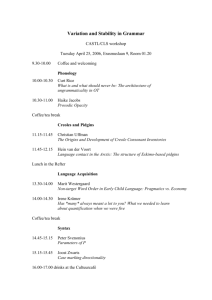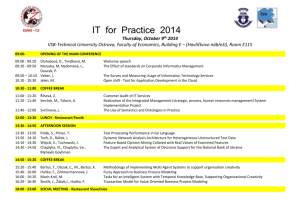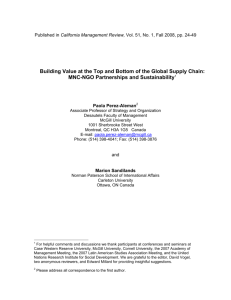Private Sector Initiative - actions on adaptation
advertisement
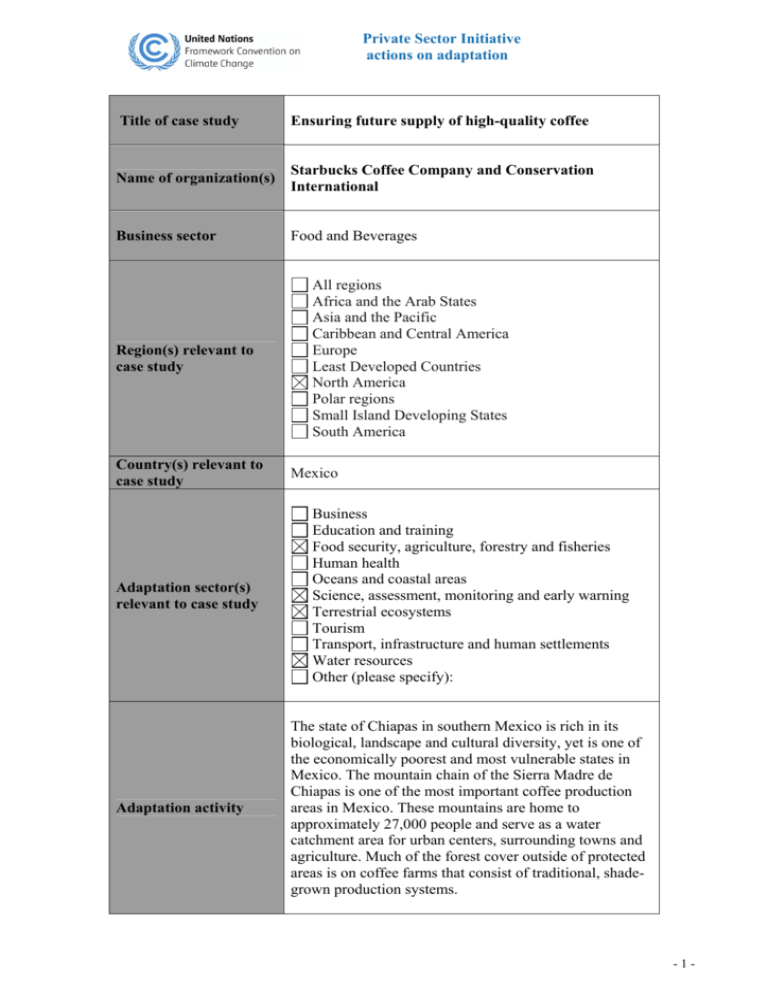
Private Sector Initiative actions on adaptation Title of case study Ensuring future supply of high-quality coffee Name of organization(s) Starbucks Coffee Company and Conservation International Business sector Food and Beverages Region(s) relevant to case study Country(s) relevant to case study Adaptation sector(s) relevant to case study Adaptation activity All regions Africa and the Arab States Asia and the Pacific Caribbean and Central America Europe Least Developed Countries North America Polar regions Small Island Developing States South America Mexico Business Education and training Food security, agriculture, forestry and fisheries Human health Oceans and coastal areas Science, assessment, monitoring and early warning Terrestrial ecosystems Tourism Transport, infrastructure and human settlements Water resources Other (please specify): The state of Chiapas in southern Mexico is rich in its biological, landscape and cultural diversity, yet is one of the economically poorest and most vulnerable states in Mexico. The mountain chain of the Sierra Madre de Chiapas is one of the most important coffee production areas in Mexico. These mountains are home to approximately 27,000 people and serve as a water catchment area for urban centers, surrounding towns and agriculture. Much of the forest cover outside of protected areas is on coffee farms that consist of traditional, shadegrown production systems. -1- Conservation International (CI) and government entities are working with several academic institutions, Starbucks Coffee Company, the Global Environment Facility and local NGOs to implement a robust approach to climate change mitigation and adaptation that includes research, policy work, and community engagement activities. Underpinning the work is a scientific effort to inform the development of climate change mitigation and adaptation strategies. To demonstrate how climate change adaptation efforts can have tangible benefits for people, CI is working with Starbucks and other partners to support farmers in developing and implementing adaptation strategies by conducting vulnerability assessments and modeling climate scenarios and their impacts on coffee cultivation. Further efforts include watershed-level management planning to ensure conservation strategies target provision of high quality fresh water in the region and that local people benefit as a result. CI and Starbucks are working with watershed committees to improve their management and to ensure long-term water provision from the Sierra Madre Mountains. The initiative will also mainstream ecosystem services and biodiversity into land-use policies, as well as increase access by farmers to payment-for-ecosystem-services mechanisms that provide incentives for land-use decisions that conserve ecosystem services and biodiversity values and improve local livelihoods. CI’s and Starbuck’s work in Chiapas demonstrates how an effective climate change strategy that includes sustainable forest management and adaptation can affect change at both the policy level and within local communities. Through strong partnerships, rigorous science and long-term commitment to building local capacity, Chiapas is succeeding in its effort to be a world leader in the development of necessary policies, institutions and projects that provide multiple benefits to people and biodiversity while mitigating and adapting to climate change. CI partnered with local cooperatives, government agencies and others to implement a set of Conservation Coffee Best Practices that promoted shade grown coffee production to maintain the forest canopy and connect farmers applying the best practices to international markets with the aim of securing better prices for their coffee. CI and Starbucks continue to collaborate in Chiapas to demonstrate that coffee can be grown in ways that support and build the resilience of communities and ecosystems. Disclaimer: These business cases have been cited to raise awareness about the engagement of the private sector in climate change adaptation. The information in the business cases has been provided either directly by the organization or obtained from a public source. The UNFCCC secretariat has not verified the information and takes no responsibility for it. Users are therefore advised to verify the information before they take any action relying on the information provided in the business cases. -2- Cost-benefit Addressing climate change is a top priority for Starbucks. Starbucks believes now is the time to increase its investments in solutions and strategies that address the climate crisis. The steps Starbucks is taking will help to ensure the reliable future supply of high-quality coffee that is essential to its business operations. Case study source(s) Conservation International: Sierra Madre de Chiapas Source: © Cristina Mittermeier, www.conservation.org Disclaimer: These business cases have been cited to raise awareness about the engagement of the private sector in climate change adaptation. The information in the business cases has been provided either directly by the organization or obtained from a public source. The UNFCCC secretariat has not verified the information and takes no responsibility for it. Users are therefore advised to verify the information before they take any action relying on the information provided in the business cases. -3-
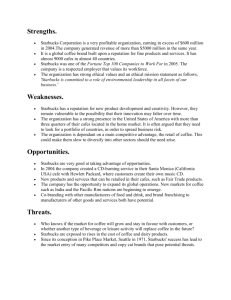


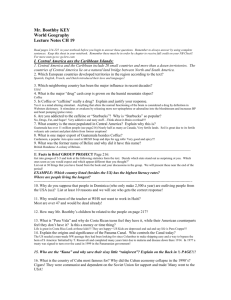
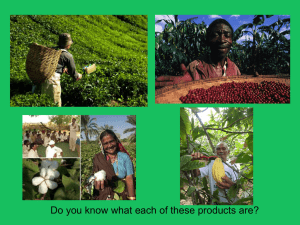
![저기요[jeo-gi-yo] - WordPress.com](http://s2.studylib.net/store/data/005572742_1-676dcc06fe6d6aaa8f3ba5da35df9fe7-300x300.png)

